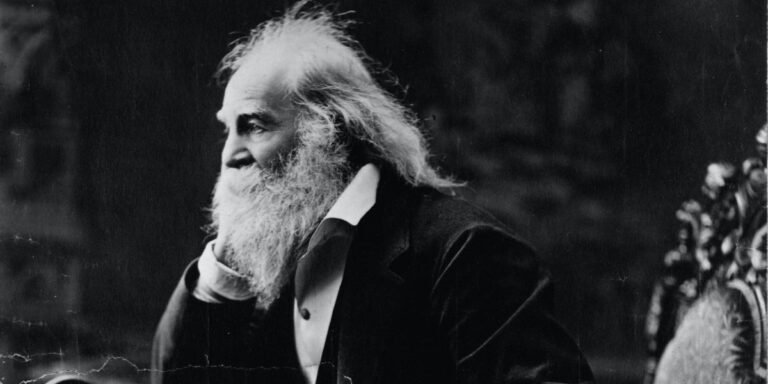Influences on Walt Whitman, known as one of the most influential poets in American literature, is celebrated for his groundbreaking work in “Leaves of Grass.” His poetry, which extols the beauty of democracy, the individual, and the natural world, was shaped by a variety of complex influences. These influences, from philosophical and spiritual beliefs to social movements and personal experiences, laid the foundation for his literary genius. In this article, we will explore the many forces that shaped Walt Whitman’s writing, helping us understand the man behind the verses that continue to resonate today.
Early Life and the Seeds of Inspiration
Walt Whitman was born on May 31, 1819, in West Hills, Long Island, New York. Growing up in a working-class family, Whitman was exposed to diverse experiences that would later inform his writing. His father, a farmer and carpenter, had a strong work ethic, while his mother nurtured his emotional and intellectual development. Although his formal education was limited, Whitman’s voracious reading habits allowed him to explore the works of the great thinkers and poets of his time.
One of the first major influences on walt Whitman was his deep connection to nature. The open landscapes of Long Island, which he often described in his poems, provided the early inspiration for his reverence for the natural world. In his early poems, Whitman wrote of the “great green fields” and “the open road,” which became recurring motifs throughout his literary career.
The Romantic and Transcendentalist Movements
Walt Whitman’s poetry was profoundly influenced by the literary and philosophical movements of his time, particularly Romanticism and Transcendentalism. Both of these movements emphasized the individual’s connection to nature, spirituality, and the rejection of conventional societal norms. While Romanticism celebrated emotion and the sublime in nature, Transcendentalism encouraged self-reliance, intuition, and the exploration of the divine within the self.
Whitman’s exposure to Transcendentalist ideas, especially those articulated by Ralph Waldo Emerson, played a pivotal role in shaping his philosophy of writing. Emerson’s essay Self-Reliance deeply influenced Whitman’s belief in the autonomy of the individual, which he later expressed in his poems. The ideals of democracy, self-expression, and unity of all people resonated with Whitman, and he sought to reflect these themes in his work.
Additionally, Whitman’s admiration for the Romantic poets, such as William Blake and Samuel Taylor Coleridge, helped him shape his own distinctive style. The Romantic notion of celebrating the sublime in nature can be seen in Whitman’s vivid descriptions of the American landscape, from the majestic prairies to the busy cities. His poetry’s emphasis on the individual’s emotional experience and connection to the natural world mirrors the core values of Romanticism.
The Civil War and Social Justice
One of the most significant influences on walt Whitman work was the American Civil War. As a witness to the devastation of the war and its impact on the nation, Whitman’s poetry took on a more profound political and social tone. He worked as a volunteer nurse during the war, caring for the wounded soldiers, and these experiences profoundly shaped his outlook on life and his poetry.
Whitman’s deep empathy for the soldiers and his belief in the importance of social justice became central themes in his later work. Poems such as “The Wound-Dresser” and “Drum-Taps” reflect the brutality of war, the suffering of individuals, and the need for healing. His poetry became a voice for the voiceless, advocating for the rights of marginalized groups and promoting unity in a divided nation. Whitman’s vision of democracy expanded to include social justice, the rights of African Americans, women, and workers, making him a poet ahead of his time.
The Influence of European Poets and Philosophy
While Whitman’s works were deeply rooted in American experiences, they were also informed by the great literary traditions of Europe. He was particularly influenced by European poets, such as the works of John Milton, William Shakespeare, and the metaphysical poets. Whitman’s embrace of free verse, a departure from the rigid structures of traditional poetry, was inspired by the flexibility he saw in European literature. His unconventional use of language and rhythm set him apart from other poets of his time.
In addition to poets, European philosophy, particularly the works of Immanuel Kant and Friedrich Nietzsche, contributed to Whitman’s views on individualism and the human spirit. Kant’s ideas on the autonomy of the individual and Nietzsche’s emphasis on the will to power resonated with Whitman’s beliefs about the strength of the human soul and its connection to the divine.
The Influence of Spirituality
Spirituality, particularly Whitman’s interest in mysticism, played a central role in his life and poetry. Although he did not adhere to any organized religion, Whitman was deeply interested in the idea of a universal spirit that connected all beings. His poetry often reflects a sense of transcendence, where the boundaries between the self and the universe dissolve.
Whitman’s spiritual influences can be traced back to the Eastern philosophies he encountered during his lifetime, including Hinduism and Buddhism. His idea of the interconnectedness of all life, seen in phrases like “I am large, I contain multitudes,” reflects a belief in the unity of all things. This spiritual dimension was one of the defining characteristics of Whitman’s work, setting him apart from other poets of his time.
A Comparison of Major Influences on Walt Whitman
To further understand the various influences on Walt Whitman, let’s break down some of the key figures and movements that shaped his work.
| Influence | Details | Impact on Whitman’s Poetry |
| Ralph Waldo Emerson | Emerson’s essays, particularly Self-Reliance and Nature, emphasized the importance of the individual and the divine within. | Inspired Whitman’s philosophy of self-reliance and individualism. Deepened his belief in the sanctity of the human spirit and its connection to nature. |
| Romantic Poets (e.g., Blake, Coleridge) | Romanticism’s focus on emotion, the sublime, and nature influenced Whitman’s vivid descriptions of the American landscape. | Fostered Whitman’s use of nature as a symbol of human experience, as well as his lyrical and free-flowing poetic style. |
| The Civil War | Whitman’s experiences as a nurse during the war influenced his sense of empathy and social justice. | Led to poems focused on themes of death, suffering, and healing, as well as the unification of a divided nation. |
| Transcendentalism | The Transcendentalist movement’s emphasis on the divine in nature and the importance of self-expression shaped Whitman’s worldview. | Influenced his belief in the interconnectedness of all life and his focus on the individual’s spiritual journey. |
| European Literary Traditions | Whitman drew inspiration from European poets like Milton and Shakespeare, as well as European philosophy (Kant, Nietzsche). | Shaped his use of free verse, symbolism, and complex philosophical themes in his poetry. |
| Spirituality and Mysticism | Whitman was deeply influenced by mysticism, especially the idea of a universal spirit connecting all beings. | Inspired his poetry’s spiritual dimension and his exploration of the self as part of a greater whole. |
Conclusion: The Enduring Legacy of Walt Whitman’s Influences
Walt Whitman’s influences were diverse, but they all shared a common theme: the celebration of the individual, the interconnectedness of all people and nature, and the importance of democratic values. His poetry, filled with raw emotion and vivid imagery, reflects these influences and continues to inspire readers worldwide.
From his transcendental ideals and romantic reverence for nature to his response to the social upheavals of his time, Whitman’s work remains an unparalleled testament to the human spirit. Today, his legacy lives on, not only through his poetry but through the enduring values of freedom, equality, and the power of the individual.

